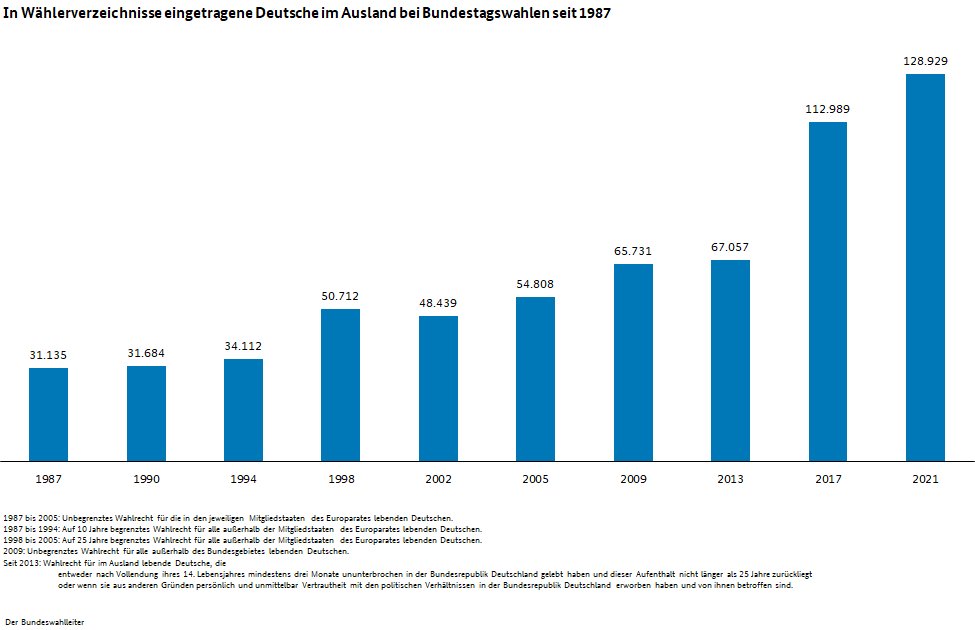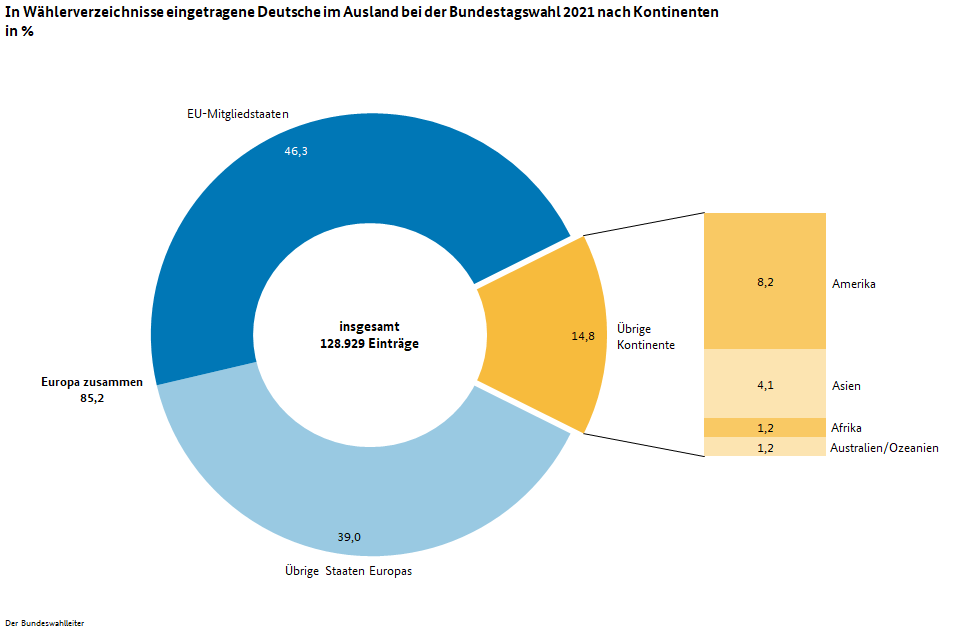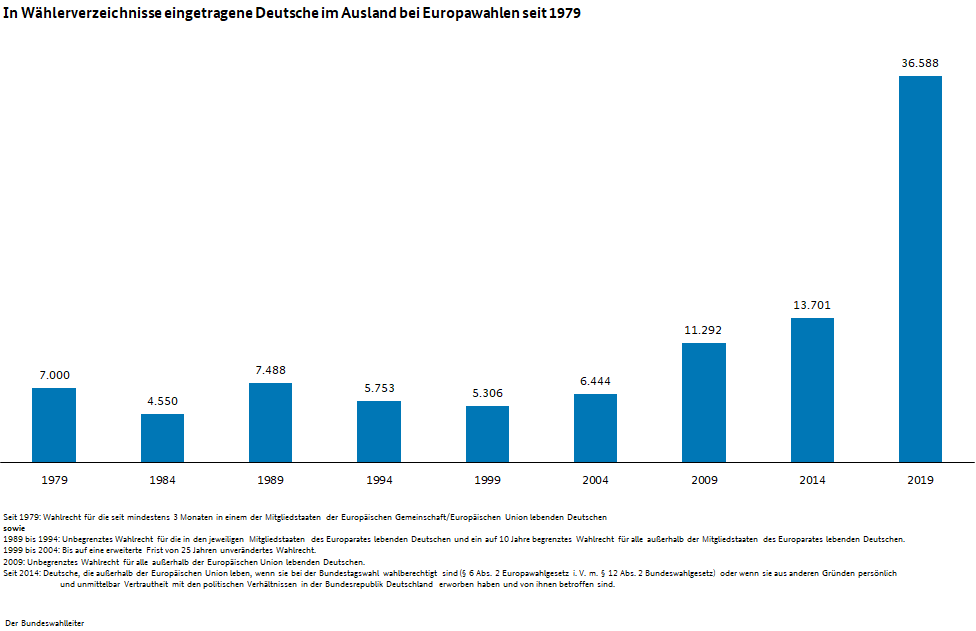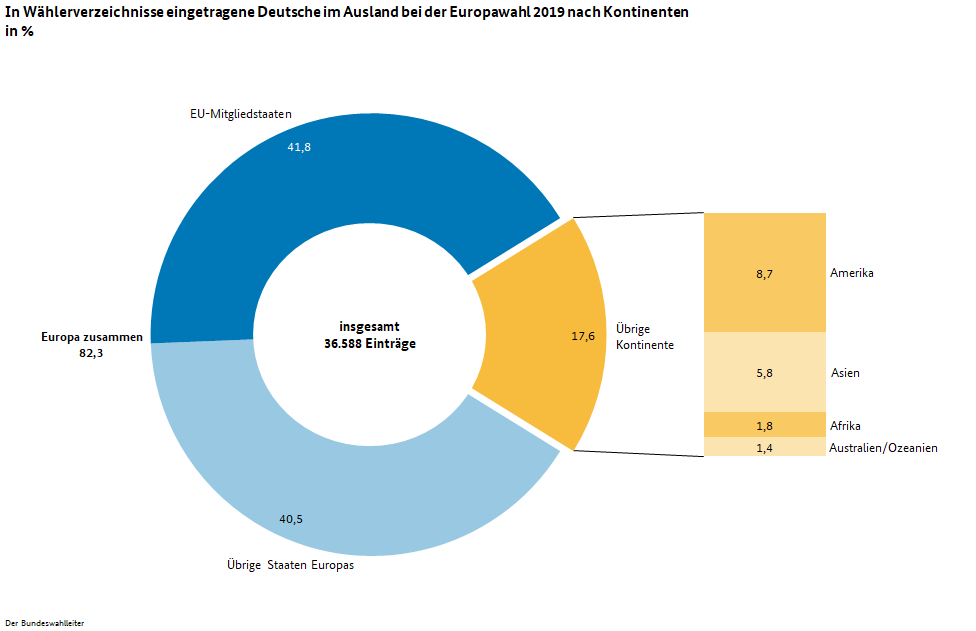Germans living abroad
Germans living abroad, also called German expatriates, are Germans entitled to vote who live outside the Federal Republic of Germany and do not have a registered place of residence in the Federal Republic of Germany.
At Bundestag elections
The voting right of Germans living abroad dates back to German Reich legislation relating to public service personnel: public servants and workers in public enterprises who lived abroad were also entitled to vote provided that their place of residence was close to the frontier of the German Reich.
This provision was initially carried over into the Federal Elections Acts of 1949 and 1953 and thereafter extended, in the Federal Elections Act of 1956, by a voting right for family members living in the same household. At the same time the requirement was deleted that the place of residence be close to the frontier.
By amendment of the Federal Elections Act in 1985, the provision was extended considerably through the introduction of the "model of combination". On the one hand, a voting right was introduced for an unlimited period of time for all Germans living in the respective member states of the Council of Europe, provided that they had had a place of residence in the former territory of the Federal Republic after 23 May 1949 or had otherwise had their habitual abode there for an uninterrupted period of at least 3 months ("Council-of-Europe solution").
On the other hand, a voting right was established under the same condition for all Germans living in other territories outside the Federal Republic of Germany, provided that their relocation had not taken place more than 10 years earlier ("time-limit solution"). In 1998 the time limit was extended to a period of 25 years.
By amendment of Section 12 (2) of the Federal Elections Act in 2008, a uniform provision applicable to all Germans living outside the Federal Republic of Germany was created in accordance with the "Council-of-Europe solution". Persuant to that provision, which was first applied in the 2009 Bundestag Election, all Germans living outside the Federal Republic of Germany had the right to vote if they had had a place of residence in the present territory of the Federal Republic, that means either in the "old" or the "new" Länder, after 23 May 1949 or otherwise had had their habitual abode there for an uninterrupted period of at least 3 months, provided that the other conditions laid down in electoral legislation were met.
The above-mentioned time limit of 3 months did not apply to returnees.
By decision of 4 July 2012 (file references: 2 BvC 1/11 and 2 BvC 2/11), the Federal Constitutional Court ruled that Section 12 (2), first sentence, of the Federal Elections Act was incompatible with the principle that elections should be general, which results from Article 38 (1) of the Basic Law, and declared it invalid.
The reform of the right to vote to be exercised by Germans living abroad became effective on 3 May 2013 (21 st Act amending the Federal Elections Act of 27 April 2013, Federal Law Gazette I p. 962). Provided the other conditions are fulfilled (their having reached the age of 18 years on election day and their not having been disqualified from voting in accordance with Section 13 of the Federal Elections Act), Germans as defined in Article 116 paragraph (1) of the Basic Law who are resident outside the Federal Republic of Germany on the day of election are also eligible to vote provided that,
- after reaching the age of fourteen years (that means from their 14 th birthday), they were either resident in the Federal Republic of Germany for an uninterrupted period of at least three months and this stay dates back not more than 25 years or,
- for other reasons, they have become familiar, personally and directly, with the political situation in the Federal Republic of Germany and are affected by it.
Legal bases:
Bundestag election: Section 12 of the Federal Elections Act (BWG)
At European elections
When the European Elections Act entered into force in 1978, the legislator saw the need to introduce a voting right in elections to the European Parliament for Germans living abroad, provided that on election day they had had a place of residence in a European territory belonging to the member states of the European Community or had otherwise had their habitual abode there for an uninterrupted period of at least 3 months. The reason why a voting right for Germans living in other EC countries was introduced much earlier than in Bundestag electoral legislation was the "pan-European" character of the direct election to the European Parliament.
In 1988 this provision was supplemented by a general reference to the voting right of Germans living abroad as laid down in the Federal Elections Act. As a consequence, all Germans living abroad which were entitled to vote in keeping with the "Council-of-Europe solution" and the "time-limit solution" of the Federal Elections Act were also entitled to vote in the European elections of 1989. The extended time limit of 25 years laid down in the Federal Elections Act in 1998 under the "time-limit solution" applied in European elections for the first time in 1999. The current provision establishing a uniform right to vote for all German citizens living outside the Federal Republic of Germany was in force at the 2009 European Elections already.
Legal bases:
European election: Section 6 of the European Elections Act (EuWG)
Regarding the procedure there is no difference between Bundestag and European elections.
All Germans living abroad have to file an official application for entry in the voters’ register before every election. Application forms and detailed information for Germans living abroad are provided about 9 months before an election on the homepage of the Federal Returning Officer at "Service for Germans living abroad".
In comparison with 1987 and 1990, the number of Germans living abroad listed in the voters' register for Bundestag elections had more than doubled until the latest Bundestag Election of 2009. Particularly the extension of the time limit to a period of 25 years under the "time-limit solution" but also the introduction of the current provision in 2008 led to a significant increase in the number of entries in the voters' register.
In contrast, the trend is not so clear for European elections. From a comparatively high base level in 1979 the number of Germans living abroad listed in the voters' register initially diminished by almost one third and then exceeded the base level when the right to vote was extended by reference to the "model of combination" laid down in federal electoral legislation. After declining again in the next election years, the number of Germans living abroad listed in the voters’ register has, in comparison with the peak value of 1989, nearly more than doubled at the latest European Election in 2009. This may have been due to the provision extending the voting right of Germans living abroad, which was included in the Federal Elections Act in 2008.
For further information see the graphics:
- Germans living abroad listed in the voters’ register for Bundestag elections
- Germans living abroad listed in the voters’ register by continents at the 2013 Bundestag Election
- Germans living abroad listed in the voters’ register for European elections
- Germans living abroad listed in the voters’ register by continents at the 2014 European Election
The data presented in the graphics refer solely to the number of Germans living abroad listed in the voters' register. Information on the voter turnout of Germans living abroad is not available.
Last updated: June 2014
Last update: 11 September 2023



